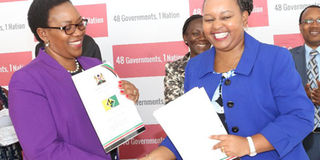Health CS Kariuki announces arrival date of Cuban doctors

Health Cabinet Secretary Sicily Kariuki (left) and Council of Governors' vice chairperson Anne Waiguru sign a memorandum supporting the importation of Cuban doctors, on May 14, 2018 at the COG offices in Nairobi. PHOTO | FILE | NATION MEDIA GROUP
What you need to know:
- Fifty Kenyan doctors will in September travel to Cuba for a two-year training.
- Council of Governors' Vice Chairperson Anne Waiguru assured the ministry of their commitment.
- The team of doctors will also partner with Kenyan researchers in the development of HIV and Hepatitis vaccines.
Your chances of soon meeting a Cuban doctor while seeking treatment in the public hospitals across the country have been significantly increased.
This follows Monday’s signing of a Memorandum of Understanding (MoU) between the Ministry of Health and the Council of Governors (CoG).
The deal will see 100 Cuban medical specialists deployed to the hospitals in the counties on a two-year contract.
At the same time, some 50 Kenyan doctors will, from September, go to Cuba on a two-year exchange programme during which they will receive specialist training in different medical fields.
This was revealed on Monday by Health Cabinet Secretary Sicily Kariuki during the signing of the agreement with the governors.
TWO SPECIALISTS
The Ministry’s Chief Administrative Secretary, Dr Rashid Aman, said the deployment of the Cuban doctors would be start on June 1, with each county getting at least two specialists.
“The Cuban experts are here to fill identified gaps in the health sector and pose no threat to their Kenyan counterparts. The MoU will trigger the airlifting of the doctors by the first week of June and spells out the obligations of the Ministry of Health and the county governments,” he said.
One of the key areas where the doctors’ expertise will be focused is management of malaria in eight counties - Kisumu, Bungoma, Kakamega, Siaya, Homa Bay, Vihiga, Busia and Migori - where prevalence of the disease is above 20 per cent. Ms Kariuki said this would be done through a Malaria Vector Control Project.
“This is of concern to us all, given that malaria remains a leading cause of death in children below five and expectant mothers. The agreement on malaria cooperation is, however, still a work in progress,” she said.
The team of doctors will also partner with Kenyan researchers in the development of HIV and Hepatitis vaccines.
EXPLORATION
“These areas are still under exploration and we are eager to learn from the successes made in Cuba,” Ms Kariuki added.
CoG chairman Josphat Nanok, who is also the Turkana Governor, said the counties were ready to work with the Cuban specialists who are expected to arrive in the country later this month.
“The occasion is a demonstration of strong Inter-Governmental Relations in addressing health issues and other national development priorities,” he said, in his statement read by Kirinyaga Governor Anne Waiguru, who is the CoG vice-chairperson.
In the deal, the national government will pay the doctors’ salaries and allowances as the counties provide housing, transport and security.
A statement from the ministry states that the doctors will be split into two clusters, with 47 working as specialists and the remaining 53 as family physicians, deployed across the counties.
RADIOLOGISTS
Three radiologists will be deployed in Siaya, Nandi and Wajir counties.
Taita-Taveta, Migori, Busia, Nyeri and Embu will get nephrologists, while Lamu, Garissa, West Pokot, Nyandarua and Homa Bay counties will get orthopaedic surgeons.
A gastroenterologist and a neurologist will be sent to Mombasa County, a dermatologist to Machakos, five general surgeons to Isiolo, Turkana, Marsabit, Mandera and Tana River, and nine critical care physicians will deployed to Kwale, Baringo, Kiambu, Nairobi and Makueni.
On March 17, President Uhuru Kenyatta signed a deal with Cuba to have the doctors sent to Kenya to boost the number of specialists in the public hospitals in the country.
The deal was part of the many signed after negotiations between the two governments. It is meant to help Kenya deal with a skills deficit in its healthcare system.






